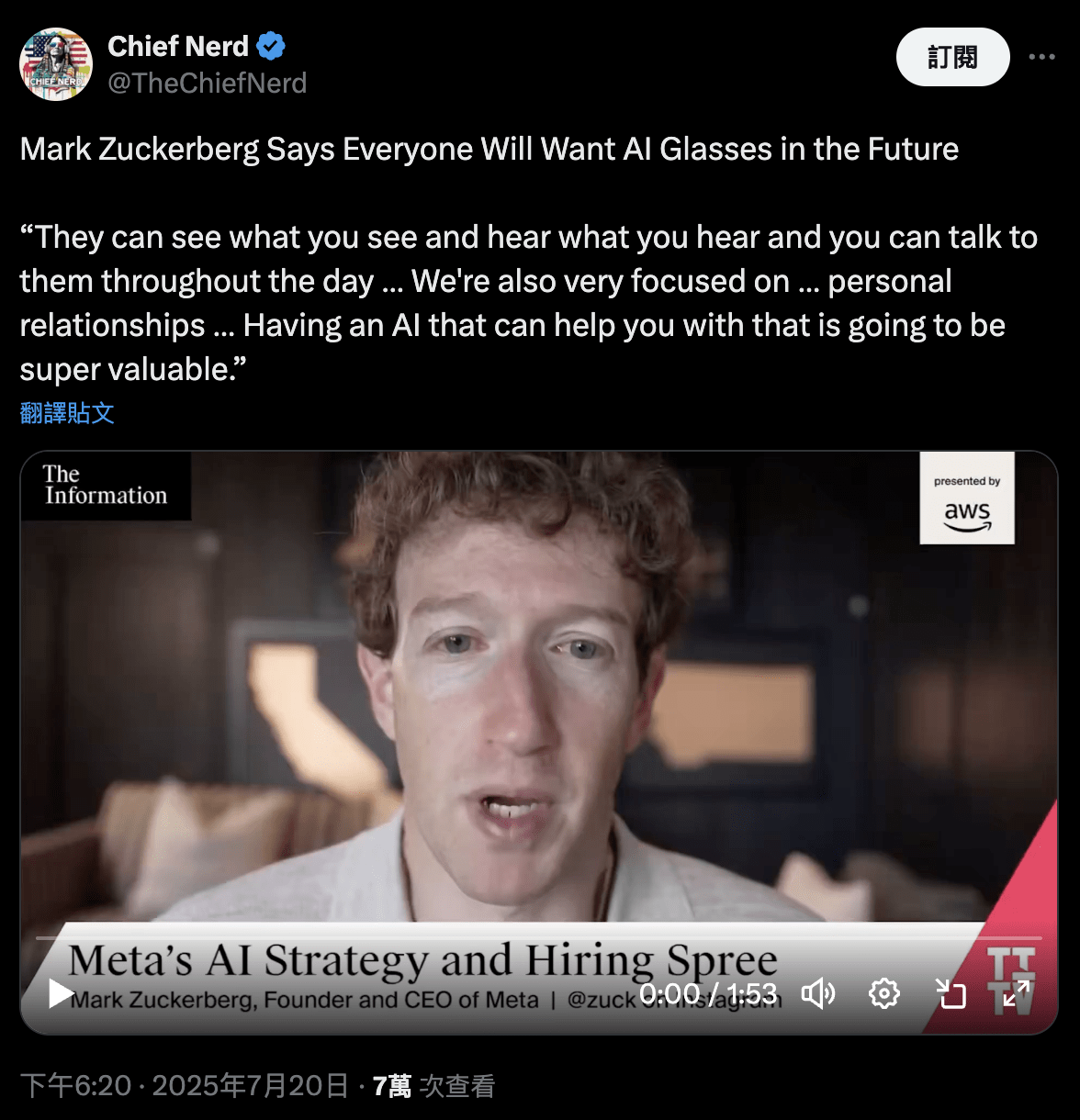What happened?
Zuckerberg stated in Meta's earnings conference that the mainstream interaction with AI in the future will be through smart glasses, and those who do not wear such devices will fall behind cognitively and be at a disadvantage. He believes that smart glasses can allow AI to 'see and hear' in real time, enhancing daily life assistance.
Meta is actively positioning itself in the AI glasses market, launching smart glasses in collaboration with Ray-Ban and Oakley, equipped with voice assistants, photo and video recording functions, and impressive sales performance. Although Reality Labs has accumulated losses nearing $70 billion, Meta still views it as a key future bet.
The competition for AI devices is fierce, and OpenAI is also advancing into the consumer device market through the acquisition of Jony Ive's startup. Zuckerberg insists that glasses are the best medium for the fusion of digital and physical worlds, while also aggressively poaching AI talent with the intention of making Meta a leader in the AI revolution.
Will those without AI glasses be at a 'cognitive disadvantage'?
Meta CEO Mark Zuckerberg recently stated that the primary way humans will interact with AI in the future will no longer be through phones or computers, but rather through "AI glasses." He even predicted that those who do not wear AI glasses will fall behind others on a cognitive level and become the weaker side.
These remarks were made during Meta's Q2 2025 earnings conference, where Zuckerberg emphasized: "I still believe that glasses will be the ideal carrier for AI because they allow AI to see what you see, hear what you hear, and continue to converse with you." He pointed out that adding display functionality, such as the Orion AR glasses that Meta plans to launch in the future, will create even greater value.
He bluntly stated: "In the future, if you do not have glasses or related devices that can interact with AI, you may have a significant cognitive gap compared to others."
In recent years, Meta has invested significant resources in its Reality Labs division, actively developing smart glasses and AR devices, with Ray-Ban Meta smart glasses being one of the most talked-about products on the market.
 Image source: X/@@TheChiefNerd
Image source: X/@@TheChiefNerd
Meta's layout and ambitions
Meta's currently launched smart glasses include the Ray-Ban Meta developed in collaboration with Ray-Ban and a recent co-branded model with the sports lifestyle brand Oakley. These glasses feature functions such as taking photos, recording videos, playing music, and voice assistants, allowing users to directly ask Meta AI what it is currently seeing.
According to data provided by eyewear giant EssilorLuxottica, sales of Ray-Ban Meta glasses have far exceeded expectations, with an annual increase of over three times, and Meta's Reality Labs division has also seen nearly 5% growth this quarter.
However, Reality Labs is still Meta's largest money-burning unit. This quarter's loss reached $4.53 billion, and the cumulative loss since 2020 has approached $70 billion.
Meta is not the only tech company optimistic about AI devices. This year, OpenAI acquired Jony Ive's startup for as much as $6.5 billion, aiming to create a 'new generation of consumer devices for interacting with AI.' Other startups are also actively exploring this industry, such as Humane's AI brooch (which later ended in failure) and AI necklaces developed by startups like Limitless and Friend.
But in Zuckerberg's view, glasses remain the most reasonable choice at present, as he believes they are the best medium for combining the digital and physical worlds.
To gain an advantage in the AI competition, Meta has also actively launched a talent acquisition war in recent years. According to financial reports, Meta invested $15 billion in the AI startup Scale AI, bringing its CEO Alexandr Wang into the company team, and successfully poached at least four employees from OpenAI, one of whom is even a co-creator of ChatGPT.
Will glasses become the ultimate device of the AI era? The answer remains to be seen, but it is certain that in this arms race for AI devices, Meta hopes to lead once again, just as Facebook redefined social platforms back in the day; now it aims to redefine people's relationship with technology through a pair of AI glasses.
This article is reprinted with permission from: (Web3+)
Original title: (The Ultimate Gateway to AI? Zuckerberg: In the future, those without smart glasses will be at a 'cognitive disadvantage')
Original author: Li Pengrui
'Predicted AI glasses will replace phones! Zuckerberg: In the future, those without them will be at a cognitive disadvantage' was first published in 'Crypto City.'
